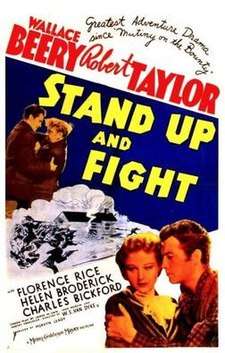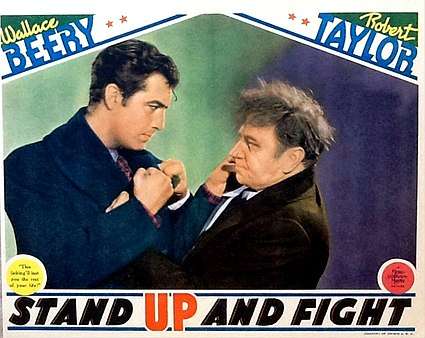Stand Up and Fight (film)
Stand Up and Fight is a 1939 film directed by W.S. Van Dyke and starring Wallace Beery and Robert Taylor. The supporting cast includes Florence Rice, Helen Broderick, Charles Bickford, Barton MacLane, Charley Grapewin, and John Qualen. Playwright Jane Murfin and novelists Harvey Fergusson and James M. Cain shared screenwriting credit.
| Stand Up and Fight | |
|---|---|
 Theatrical Film Poster | |
| Directed by | W.S. Van Dyke |
| Produced by | Mervyn LeRoy |
| Written by | James M. Cain, Jane Murfin, Harvey Fergusson, Laurence Stallings |
| Starring | Wallace Beery Robert Taylor |
| Music by | William Axt |
| Cinematography | Leonard Smith |
| Edited by | Frank Sullivan |
| Distributed by | Metro-Goldwyn-Mayer |
Release date |
|
Running time | 97 minutes |
| Country | United States |
| Language | English |
| Budget | $1,055,000[1] |
| Box office | $1,840,000[1] |
Plot
Blake Cantrell (Robert Taylor), an aristocrat from Maryland and a well-groomed cynic, uses his organized hunt to announce his imminent bankruptcy. In order to pay off his debts, Blake is forced to sell even his slaves, instead of freeing them, which causes the disapproval of his guest Susan Griffith (Florence Rice).
Later in the evening, when he tries to seduce the girl, she bumps him back and leaves the mansion urgently. However, Blake is also forced to leave his home, since it was sold to cover his debts. He arrives to Cumberland to get a job at his father's old friend, Colonel Webb (Jonathan Hale), the head of the Baltimore-Ohio railroad construction. Webb offers Blake a job which consists of spying on Starkey (Wallace Beery), the head of a competing shipping company, but Blake refuses. In the evening of the same day, Blake is jailed for a fight.
Cast

- Wallace Beery as Starkey
- Robert Taylor as Blake Cantrell
- Florence Rice as Susan Griffith
- Helen Broderick as Mandy Griffith
- Charles Bickford as Mr. Arnold (Morgan)
- Barton MacLane as Mr. Crowder
- Charley Grapewin as "Old Puff"
- John Qualen as Davy
- Robert Gleckler as Sheriff Barney
- Jonathan Hale as Colonel Webb
Box office
According to MGM records, the film earned $1,233,000 in the US and Canada and $607,000 elsewhere resulting in a profit of $183,000.[1]
References
- The Eddie Mannix Ledger, Los Angeles: Margaret Herrick Library, Center for Motion Picture Study.
External links
- Stand Up and Fight on IMDb
- Stand Up and Fight at AllMovie
- Stand Up and Fight at the TCM Movie Database
- Stand Up and Fight at the American Film Institute Catalog